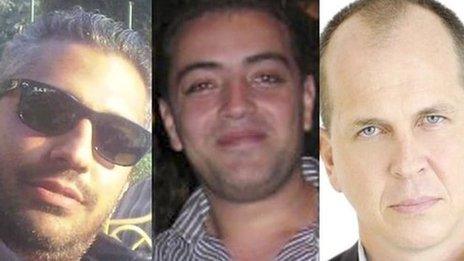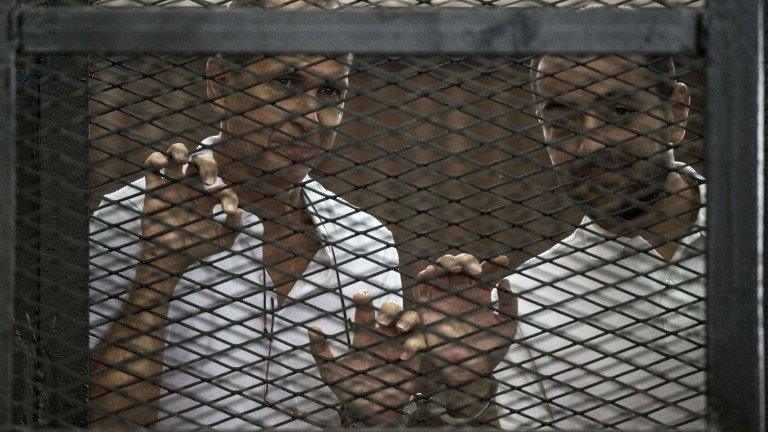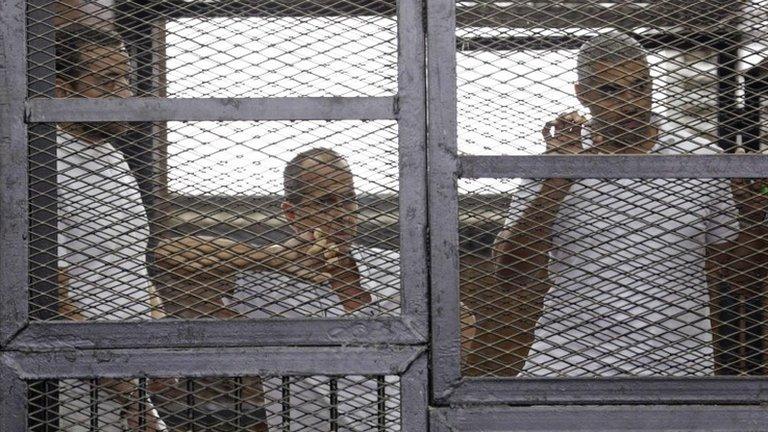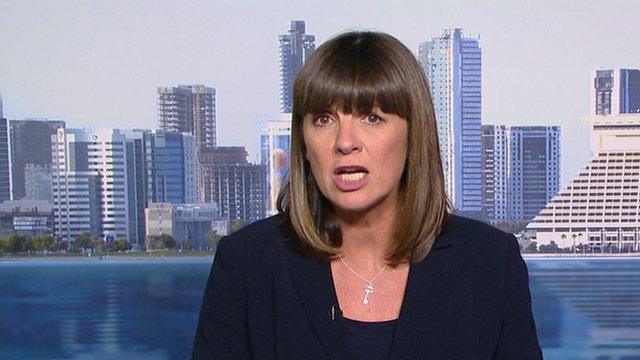UK reporters shocked at Egypt's 10-year sentence
- Published
Al-Jazeera's Sue Turton: "It's really heart-breaking and infuriating"
Two UK journalists have spoken of their shock at being sentenced to 10 years in prison by an Egyptian court for "falsifying news".
Sue Turton and Dominic Kane said there had been a miscarriage of justice.
The pair were tried in absentia, and were not in Egypt for the trial.
Three of their al-Jazeera colleagues, including award-winning journalist Peter Greste, have been imprisoned in Egypt after also being found guilty during the same trial.
Prime Minister David Cameron said he was "completely appalled" by the verdicts, and Egypt's ambassador has been summoned to the Foreign Office.
'Ludicrous'
Ms Turton said her sentence would mean she would be unable to travel to many places around the globe.
"But at least I am not incarcerated", she said, speaking to the BBC from Doha in Qatar, where al-Jazeera is based.
Dominic Kane also told BBC News that the accusations against himself and his colleagues were "flimsy, incoherent and inexplicable".
"The suggestion that we were somehow spreading propaganda is absolutely ludicrous," he said.

Mohamed Fahmy, Baher Mohamed and Peter Greste (pictured left to right) denied the charges
He also said that because both Ms Turton and himself had been found guilty 'in absentia', it meant they could not appeal against their sentences individually, as it would involve surrendering themselves to the Egyptian legal system.
He said only the UK government could now intervene on their behalf.
'Heartbreaking'
Meanwhile Greste - who used to work for the BBC - and reporter Mohamed Fahmy and producer Baher Mohamed were tried in Cairo and are currently in the city's Tora prison, which Mr Kane described as "inhospitable and downright appalling".
The journalists were found guilty of supporting the now banned Muslim Brotherhood and spreading false news. They denied the charges, but have been jailed for seven, seven and 10 years respectively.
They were arrested last December and accused of making reports that were sympathetic to former Egyptian President Mohammed Morsi and the Muslim Brotherhood.
Ms Turton said: "We really thought we could trust the Egyptian judicial system to be fair and expected the judge to come out and say he had found us not guilty, because he recognised these were politically motivated charges.
"We had really hoped that they would be released from prison and we would be welcoming them back to Doha with great relief."
She praised her colleagues as "great journalists" who "always tried to give a fair and balanced picture" of what was going on in Egypt.
"It's heartbreaking," she added.
The trial has caused an international outcry amid claims it was politicised.
Foreign Secretary William Hague said he was "appalled by the guilty verdicts" and said press freedom was the "cornerstone of a stable and prosperous society".
He added: "I am particularly concerned by unacceptable procedural shortcomings during the trial process, including that key prosecution evidence was not made available to the defence team."
The BBC's James Harding: "The whole judicial process here is beginning to look like an act of intimidation"
His sentiments were echoed by Deputy Prime Minister Nick Clegg, who said the UK government would continue to press the Egyptian authorities to "both urgently review this case and to demonstrate a much clearer and more consistent commitment to freedom of the press and freedom of expression."
James Harding, the BBC's director of news, described the verdicts as "preposterously unjust" and an "act of intimidation against all journalists".
He said the corporation had drafted a letter to Egypt President al-Sisi, outlining his concerns.
- Published23 June 2014

- Published24 June 2014

- Published23 June 2014

- Published23 June 2014